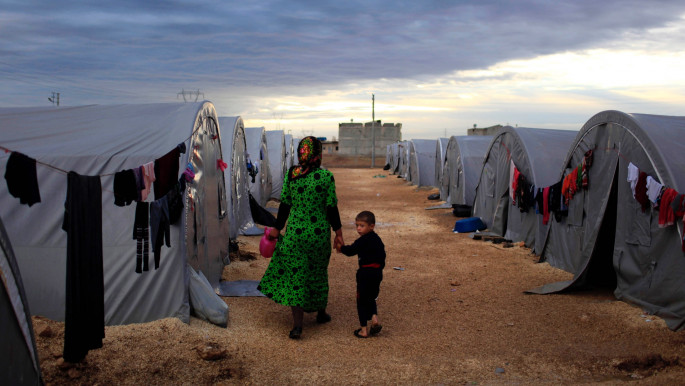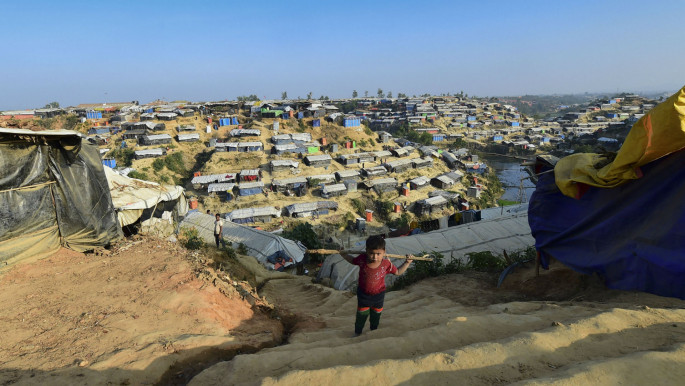Internet ban spreads coronavirus fears faster than infection at Rohingya refugee camps
A humanitarian crisis looms over some 1.2 million Rohingya Muslims who fled to Bangladesh from Myanmar's brutal military crackdown, as they struggle to survive in cramped and squalid conditions at government-run camps in Kutapalong, Ukhia, and in Tecknaf Upazila, which runs along the coast of Myanmar.
But in the absence of mobile and internet connection - a ban was implemented in September 2019 - misinformation about the coronavirus epidemic is spreading rumours and fears faster than the virus itself, aid workers and Rohingya refugees on the ground have said.
A What Matters bulletin produced by Translators Without Borders and BBC Media Action reported that coronavirus rumours were circulating through camps. While some heard that random drugs offer a cure, others believed the virus would kill anyone that caught it.
According to the report, some women at the camps were "scared" to tell anyone about symptoms they felt. There were also rumours that those with coronavirus would be taken away, never to be seen again.
One woman said neighbours had warned her about going to see a doctor as contracting the virus meant "they will shoot us to death since this virus can affect anyone who is in contact with the patient."
 |
In the absence of mobile and internet connection, misinformation about the coronavirus epidemic is spreading rumours and fears faster than the virus itself |  |
Another said: "We are the older group in the community; this is the time we are not thinking of ourselves as we are going to die soon. Rather, we are more concerned about our family and relatives."
Social activist and filmmaker Mohammad Arfaat told The New Arab: "If there is internet, rumours would not influence the community. It is time for the Bangladesh government to reopen the internet to Rohingya survivors so they can get factual information from the UNHCR and other organisations about Covid-19".
Read more: Syria Weekly: Coronavirus reaps further miseries on Syrians
The 25-year-old fled his home in Myanmar in 2012 with three of his friends. After witnessing one of them die along the journey, he was compelled to make a film about the Rohingya story and about the death of his friend.
Arfaat said the internet ban is fuelling fears, and that rumours about coronavirus are making it tough for the Rohingya to deal with the pandemic. "Many Rohingya are crying and are traumatised by fears of coronavirus," he said.
 |
|
| Read more: For Middle East refugees, social distancing is a privilege few can afford |
The UN has confirmed there are zero cases of Covid-19 at the camps so far. But across the country, the Bangladesh government has confirmed 48 reported cases and five deaths.
Rules of the lockdown imposed by the Bangladesh government kicked in last week and are expected to be observed until 15 April.
Doctors without Borders outreach worker and Rohingya poet Mohammad Ullah Nurul Amin told The New Arab that violation of curfews banning groups of more than three meant "anyone seen outside without essential preventative measures will be beaten black and blue."
But Arfaat said such measures like gloves, sanitisers and masks were "too expensive" for the Rohingya to buy and most people do not have them."
He added the army "beats people with rods if any Rohingya refugee is found outside," which, he said was the case for two Rohingya youths who did not receive information about the lockdown.
Last Wednesday, Arfaat said the government of Bangladesh distributed a notice about the lockdown with information about coronavirus. But he said it was written in Bengali, a language most Rohingya do not understand.
Jessica Olney, an analyst on the ground researching the coping mechanisms of Rohingya refugees said one aid worker told her a shortage of supplies meant those on the frontlines were working without protection.
She told The New Arab: "People are very afraid and markets are now closed so there is no way to buy fish and vegetables. Buying these in the market is a common way for people to supplement the food rations they receive as aid. Basic nutrition could be affected if there are any disruptions to aid distribution, which is the sole lifeline for food security."
 |
Some women at the camps were 'scared' to tell anyone about symptoms they felt. There were also rumours that those with coronavirus would be taken away, never to be seen again |  |
The absence of testing for Covid-19 at the camp, she said, has led "people to assume the worst," heightening fears in the face of an information deficit. She added that several refugees had contacted her in recent days because they were panicked after experiencing the minor symptoms of a cold.
According to Dr Sayem Udin, who works for the International Rescue Committee's 24 hour emergency hospital in Shamplaur, there was a case of a quarantined woman at Sadar District Hospital who arrived after returning from Hajj, an annual Islamic pilgrimage to Mecca, Saudi Arabia.
Read more: Five organisations providing coronavirus aid
Currently, he said, 26 people, including a doctor and nurse who treated the patient, are in quarantine.
A Rohingya family that arrived from India has also been put into quarantine at the Teknaf Leda Camp.
Tensions heightened on Wednesday afternoon though after a fire broke out at section 22 of Kutapalong camp. Journalist on the ground Mohammad Sharif told The New Arab that "an internal source" confirmed there were no injuries, however four houses were burned.
 |
|
| Read more: Internet ban in Bangladesh's Rohingya camps will cost lives during Covid-19 pandemic |
The situation has added pressure to an already challenging climate of fear caused by Covid-19 and where temperatures are also rising as people complain of the heat.
Education researcher Ana Collins returned from Bangladesh to New Zealand after the outbreak of Covid-19 was announced. She said the pandemic has made the situation on the ground "very sensitive" and more so than usual. She said it would be "very difficult for the emergency hospitals to cope" should the outbreak impact refugees at the camps.
Collins added: "Before I left, foreigners had been issued with a notice to stay away from camp unless strictly necessary. No one wanted to be seen as responsible for bringing Covid-19 to the Rohingya refugee camp."
She pointed out that Dhaka is the only place in the whole of Bangladesh where Covid-19 tests are processed. She said this means it is impossible to know the extent of the potential spread at the refugee camp or across other parts of Bangladesh.
 |
The absence of testing for Covid-19 at camps has led people to assume the worst, heightening fears in the face of an information deficit |  |
But she added that the dynamic between the Bangladeshi government and the Rohingya camp is "complex." She said this is "because they are also trying to handle their own national Covid-19 crisis, which is unfortunately going to be unmanageable across the country."
A report issued by the government of Bangladesh stated that learning centres, educational facilities and spaces for children and the elderly are to be temporarily closed. However, it stated provision will be made for hygiene promotion, health awareness, food distribution, case management and the reception of new arrivals.
UNHCR spokesperson Louise Donavon told The New Arab: "The health and well-being of refugees and host communities is our top priority. While there are currently no suspected cases of Covid-19 in the camps, we are taking the situation very seriously."
She said that the Office of the Refugee Relief and Repatriation Commissioner (RRRC) "officially confirmed" that all activities - except essential services - at all 34 Rohingya Camps in Cox's Bazar, would be suspended from 25 March "in a bid to avert an outbreak of Covid-19."
Donavon said the RRRC issued an advisory detailing the essential services that will continue in camps.
She added: "These include health, nutrition, information hubs, hygiene promotion and health awareness, individual protection services, reception of new arrivals, maintenance of water and sanitation facilities, as well as key distributions such as food, liquid petroleum gas and hygiene kits. All gatherings, including religious ones, are banned within the camps."
The Government of Bangladesh has been contacted for comment.





 Follow the Middle East's top stories in English at The New Arab on Google News
Follow the Middle East's top stories in English at The New Arab on Google News


